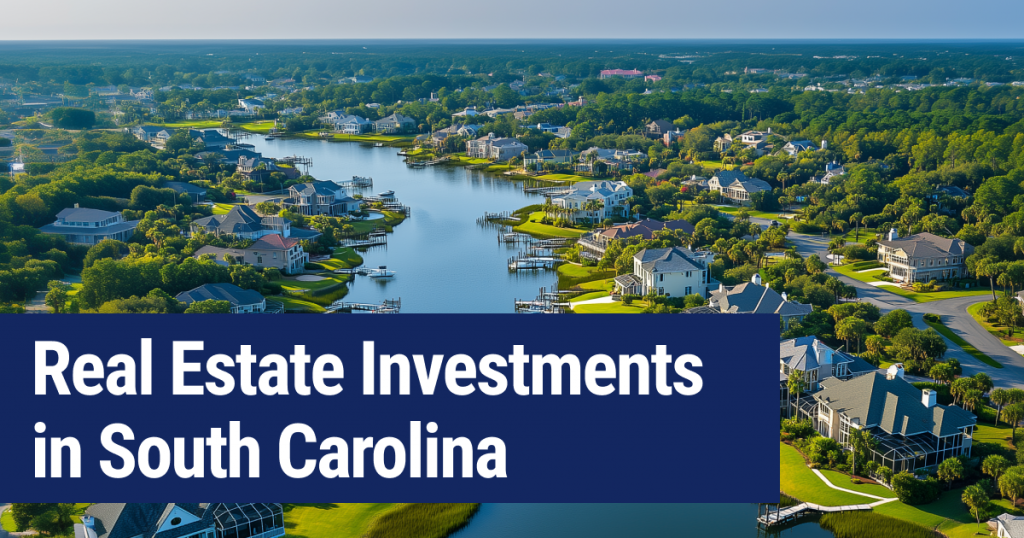Real Estate Investment in South Carolina

In this guide, you will discover everything you need to know about investing in real estate in South Carolina, a US state that has been gaining increasing attention among real estate investors worldwide, especially those from Israel. With developing cities, a high quality of life and a pleasant climate, many consider South Carolina an attractive option for investments in residential, commercial or rental properties.
This article explores the key characteristics of South Carolina’s real estate market, as well as general trends and advantages and challenges, and provides an overview of the real estate landscape without offering specific recommendations or numerical data such as returns or appreciation rates.
- Key Cities for Real Estate Investment in South Carolina
- Why Is South Carolina Attracting Attention?
- Types of Real Estate Investments in South Carolina
- Challenges to Consider
- How to Begin Exploring the Real Estate Market in South Carolina
- Conclusion
Key Cities for Real Estate Investment in South Carolina
South Carolina is located in the southeastern United States along the Atlantic Ocean. It is considered economically stable, with a mix of industries including manufacturing, agriculture, technology, tourism and education.
The main cities currently attracting real estate interest include:
- Charleston: A historic port city with a rich tourism profile.
- Columbia: The state capital, home to academic and institutional centres.
- Greenville: An emerging destination for families and tech companies.
Why Is South Carolina Attracting Attention?
- Stability and Relatively Affordable Prices
One of the reasons investors are interested in South Carolina is that the market is considered more accessible in terms of price levels compared with highly sought-after cities in the North or on the West Coast. For those seeking a lower entry threshold, this is a significant factor. - Population Growth and Development Momentum
In recent years, there has been a clear trend of positive internal migration to South Carolina. Americans from other states are relocating to the state due to its lower cost of living, diverse job market and comfortable lifestyle. - Growing Tourism Sector
Cities such as Charleston have become popular destinations for both domestic and international tourism, which also increases demand for short-term rentals, such as vacation properties.
Types of Real Estate Investments in South Carolina
- Single-family homes in suburban areas: A common choice among those looking for long-term rental demand from families.
- Long-term rental apartments: Often located near urban centres, universities or employment hubs.
- Light commercial properties: Including shops, offices or storage spaces in growing cities.
- Vacation and tourism-related properties: Primarily near beaches or resort areas.
Challenges to Consider
Alongside the state’s advantages, it’s important to be aware of some of the challenges of investing in real estate in South Carolina:
- Geographic distance and remote management: Investors from outside the US typically require professional property management and reliable local partners.
- Understanding local regulations: Regulations and laws differ from state to state, including regulations on taxation, tenant rights and urban planning.
- Increasing competition in certain areas: In recent years, the market has become more competitive, especially in more populated cities.
How to Begin Exploring the Real Estate Market in South Carolina
Regardless of the investment scale, several initial steps are recommended:
- Research different areas in the state: Understand the distinctions between cities, residential vs. industrial zones, and so on.
- Connect with local professionals: Get in touch with real estate agents, lawyers, accountants and property management companies.
- Visit the area in person (if possible): There’s no substitute for experiencing neighbourhoods, transportation and the environment firsthand.
- Review data from official sources: Review official state websites, city development plans, public reports and more.
Conclusion
Real estate investment in South Carolina is generating growing international interest due to a combination of the state’s affordability, quality of life, positive development trends and business-friendly environment. However, as with any investment, it is important to approach the process with a thorough understanding of what is involved, including conducting a risk analysis, and without relying on promises or fixed figures.
